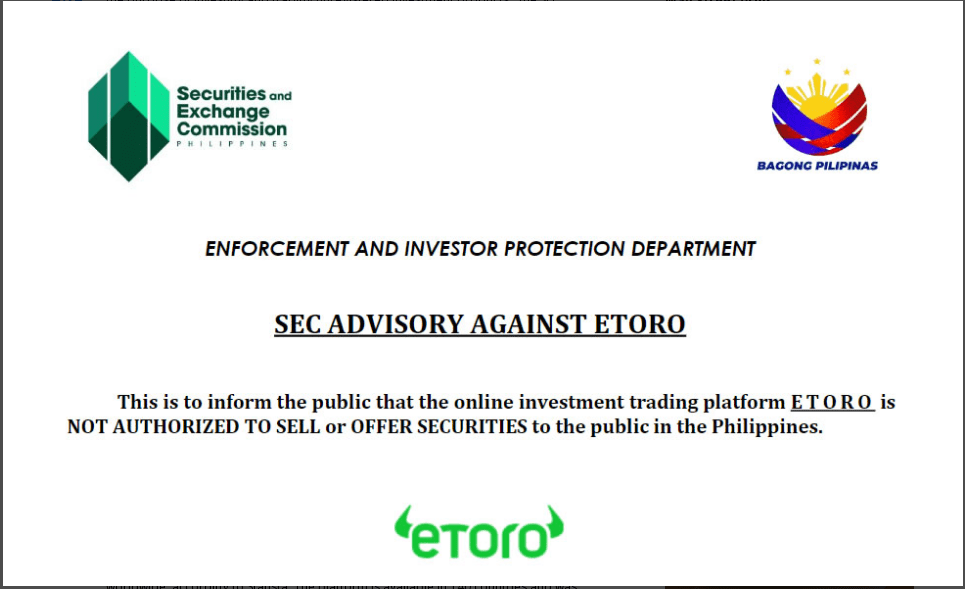Philippine investors are being warned by the Securities and Exchange Commission (SEC) about the dangers of using unregistered online investment platforms. The latest target is eToro, a popular multinational online crypto trading platform with over 33 million users worldwide.
eToro Not Registered In The Philippines
According to the SEC, eToro is not registered as a corporation in the Philippines and critically lacks the necessary licenses required under the country’s Securities Regulation Code.
This code outlines the legal requirements for companies selling securities, operating as broker-dealers, or running exchanges for trading securities within the country.
The unregistered status of eToro raises red flags for the Philippine regulator. Unregistered platforms are not subject to the same level of regulatory oversight as licensed ones.
This lack of oversight could potentially expose Filipino investors to greater risks, including fraud, manipulation, and difficulty recovering invested funds.
The SEC issued an advisory in March, publicly announced on April 4th, stating that eToro is not authorized to sell or offer securities to the public in the Philippines.
The advisory highlights concerns that Filipinos can create user accounts on eToro for the purpose of investing in unregistered investment products.

The SEC advisory warns the public “to exercise caution before investing in these kinds of unregistered online investment platforms and their representatives.”
The advisory further emphasizes the potential legal consequences for those promoting eToro’s services in the Philippines without a license. Penalties include hefty fines of up to $88,300 and imprisonment for up to 21 years.
eToro’s Response And Wider Regulatory Trend
Despite the SEC’s advisory, eToro’s website currently lists the Philippines as a supported country.
This crackdown on eToro is part of a wider trend in the Philippines aimed at regulating the online investment landscape.
In November 2023, the SEC issued a similar advisory against cryptocurrency exchange Binance, citing similar concerns about unauthorized securities offerings.
This was followed by the National Telecommunications Commission (NTC) blocking access to unlicensed crypto exchange websites in March 2024.
The Philippine government’s actions highlight a growing concern among regulators worldwide regarding the potential risks associated with the rise of online investment platforms.
While these platforms offer increased accessibility and potentially lower barriers to entry for investors, the lack of proper oversight can pose significant risks.
The Philippines’ case against eToro serves as a cautionary tale for both investors and online investment platforms. Investors are urged to conduct thorough research and ensure platforms they use are properly licensed and regulated within their jurisdiction.
Online investment platforms, on the other hand, need to be mindful of international regulations and ensure they comply with the legal requirements of the countries where they operate.
Featured image from The TCM Group, chart from TradingView










